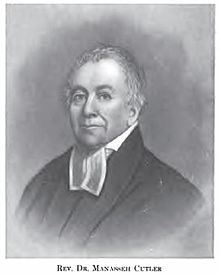Manasseh Cutler
U.S. House of Representatives from Massachusetts | |
|---|---|
| In office March 4, 1801 – March 3, 1805 | |
| Preceded by | |
| Succeeded by | |
| Constituency |
|
| Personal details | |
| Born | May 13, 1742 Federalist |
| Alma mater | Yale College |
| Military service | |
| Allegiance | United States |
| Branch/service | Continental Army |
| Years of service | 1776, 1778 |
| Rank | Chaplain |
| Unit | 11th Massachusetts Regiment |
| Battles/wars | American Revolutionary War |
Manasseh Cutler (May 13, 1742 – July 28, 1823) was an American
Congregational clergyman involved in the American Revolutionary War. He was influential in the passage of the Northwest Ordinance of 1787 and wrote the section prohibiting slavery in the Northwest Territory. Cutler was also a member of the United States House of Representatives. Cutler is "rightly entitled to be called 'The Father of Ohio University.'"[1]
Biography

Cutler was born in
Boston. In 1778, he became chaplain to General Jonathan Titcomb's brigade and took part in General John Sullivan's expedition to Rhode Island
. Soon after his return from this expedition he trained in medicine to supplement the scanty income of a minister. In 1782, he established a private boarding school, directing it for nearly a quarter of a century. In 1784 a geological party, headed by Manasseh Cutler, named the highest peak in the northeast Mount Washington.
In 1786, Cutler became interested in the settlement of western lands by
Northwest Ordinance of 1787 for the government of the Northwest Territory, particularly its prohibitions regarding slavery in the new territories,[7] which was finally presented to Congress by Massachusetts delegate Nathan Dane. In order to smooth passage of the Northwest Ordinance, Cutler influenced and won the votes of key congressmen by making them partners in his land company [citation needed]. By changing the office of provisional governor from an elected to an appointed position, Cutler was able to offer the position to the president of Congress, Arthur St. Clair.[8]
Cutler was friends with
Doctor of Laws from Yale University in 1789. Manasseh was elected a member of the American Antiquarian Society in 1813.[12]
Cutler died in 1823 at Hamilton, Massachusetts.
Three of his descendants were members of the U.S. Congress-and one vice president:
- William P. Cutler [1812-1889] son of Ephraim Cutler
- Charles Gates Dawes and Beman Gates Dawes; he was the son of Mrs. Sarah (Cutler) Dawes daughter of Ephraim Cutler[13]
- Beman Gates Dawes [1870-1953] son of Congressman Rufus Dawes
-
Departure of pioneers from Manasseh Cutler's parsonage in 1787
-
Manasseh Cutler prepared this wagon for the first pioneers to the Ohio Country
See also
References
- ^ Life of Manasseh Cutler, Vol. 2, p. 21.
- ^ ISBN 978-1-5011-6869-7. Retrieved July 9, 2019.
- ^ Cutler, William Parker; Cutler, Julia Perkins (1888). Life, Journals and Correspondence of Rev. Manasseh Cutler, LL.D. R. Clarke. p. 56. Retrieved June 5, 2021.
- ISBN 978-1501168680.
- ^ "Appalachia". www.ohio.edu. Retrieved October 12, 2022.
- ^ "Appalachian Regional Commission". www.arc.gov. Retrieved October 12, 2022.
- ^ "Dr. Cutler and the Ordinance of 1787". www.loc.gov. Retrieved June 15, 2022.
- ^ McDougall, Walter A. Freedom Just Around the Corner: A New American History, 1585-1828. (New York: Harper Collins, 2004), p. 289.
- ISBN 978-1416954187.
- ^ "Book of Members, 1780–2010: Chapter C" (PDF). American Academy of Arts and Sciences. Retrieved July 28, 2014.
- ^ "APS Member History". search.amphilsoc.org. Retrieved December 16, 2020.
- ^ American Antiquarian Society Members Directory
- ^ New England Families, Genealogical and Memorial
- This article incorporates text from a publication now in the public domain: Chisholm, Hugh, ed. (1911). "Cutler, Manasseh". Encyclopædia Britannica. Vol. 7 (11th ed.). Cambridge University Press. p. 671.
- United States Congress. "Manasseh Cutler (id: C001026)". Biographical Directory of the United States Congress.
External links
- Manasseh Cutler at Ohio History Central
- Cutler, W.P.; Cutler, J.P. (1888). Life Journals and Correspondence of Rev. Manasseh Cutler 2 vols. Cincinnati: Robert Clarke & Company.
- Potts, Louis W. (Summer–Autumn 1987). "Manasseh Cutler, Lobbyist". Ohio History. 96: 101–123.[permanent dead link]
- Wilson, James Grant; Fiske, John (1887). "Manasseh Cutler". Appleton's Cyclopædia of American Biography. Vol. 2. p. 47.




